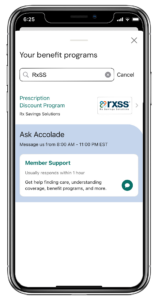It’s been 20-plus years since “personalized healthcare” was hailed the future of healthcare. What does it mean, exactly, and where are we today?
Over the years the concept has taken on different yet related meanings:
- In the clinical world, “personalized” means harnessing all available technology, science and data in order to calibrate treatment to a patient’s unique personal and genetic makeup.
- To health systems, it’s about getting a person the right care at the right time, from connected providers who know the whole person.
- For patients, it means access to care, treatment and services aligned to their individual needs, with the least amount of friction involved.
Those generalizations make it sound so simple. Real-world complexities may be why the promised future has proved so elusive. Today, however, it may finally be taking shape.
The Future at Work
Look no further than the Accolade model as a compelling example. We shared the virtual stage with fellow partners Virta Health and Sword Health at Accolade’s recent Evolve ’21 conference. All of us played a part in the journey of Katherine, an Accolade member whose story served as a backdrop for the 3-day event.
Katherine has diabetes and debilitating pain from a musculoskeletal (MSK) condition. She decided to take charge of her health and get her life back.
Her experience with Accolade and partners demonstrates how a truly personalized approach can produce better outcomes:
- She established a relationship with an Accolade primary care physician and multidisciplinary care team.
- She and her care team were alerted to savings opportunities on her diabetes medications, thanks to Accolade’s integration with Rx Savings Solutions.
- Her Accolade physician recommended she enroll in Virta’s program to address her poorly controlled diabetes.
- An Accolade medical consult specialist suggested she try Sword’s digital MSK treatment plan, to see if physical therapy might be a clinically appropriate alternative to surgery.


Fast-forward to Katherine today:
- We moved her to a medication regimen she could afford to take as prescribed.
- Virta helped her reverse her diabetes through diet and lifestyle.
- Sword’s physical therapy helped her avoid surgery and still eliminate the MSK pain.
Two immediate takeaways: 1) Katherine’s health outlook looks completely different than it once did, and so does her future; 2) No single system, program or enterprise could accomplish this alone.
It Takes an Ecosystem
How do we replicate Katherine’s experience and outcome for every patient? How do we transform an antiquated, paper-based and impersonal system?
A few large and well-funded organizations have tried building a comprehensive model on their own. History has shown that healthcare is a sector where huge initiatives go to die. An ecosystem of innovators and disruptors seems better equipped and positioned to drive change.
Different partners can focus all their energies and innovation on one condition like diabetes, or to address a single barrier like getting a second opinion from a specialist, or develop smarter ways to purchase prescriptions.
Once the best health tech solutions prove their value to the market, smart companies like Accolade add us to their partner mix. Rx Savings Solutions is part of a growing number of these strategic partnerships because they’re a great way to advance our own mission. Together we’re better, in a 1 + 1 = 3 kind of way.
Employers and health plans like the model, too. New solutions are already vetted. Integrations and data dependencies are pre-established. Pricing and contracts are more streamlined and increasingly value-based.
Dan Dentzer, Manager of Health & Wellness Design for United Airlines, weighed in at the Evolve conference: “What we’ve been able to do working together with Rx Savings and Accolade is move roughly 2,500 members into lower-cost alternatives, saving the plan over $1 million in the past 11 months, with member savings close to $300,000. It’s been a win-win on all sides. It’s really been a very positive experience for us, and we’re just getting started.”
Let’s not forget the material benefit of personalized healthcare: lower costs. Think back to Katherine’s story. She reduced the most frequent and repeated expense in healthcare—prescription drugs—for herself and her employer. She significantly lowered her risk for hospitalization and more costly diabetes care. She avoided expensive surgery and recovery time away from work.
Every partner in the Accolade ecosystem addresses a different condition or barrier. Yet there are common threads. Users engage digitally. Data is utilized by multiple integrated solutions. And, perhaps ironically, this combination enables stronger human touch points throughout the care journey. You might say it puts the person in “personalized” healthcare.
We owe it to ourselves to advance this future.
